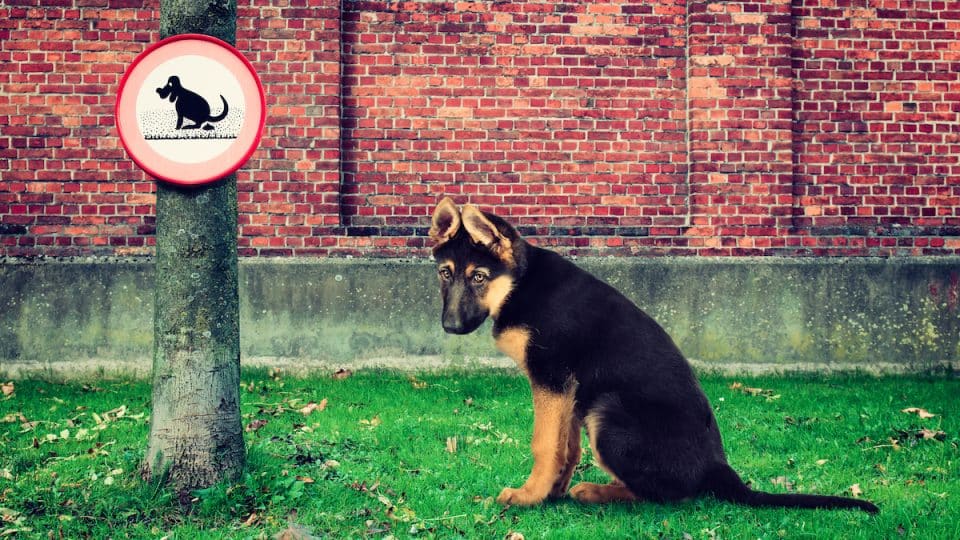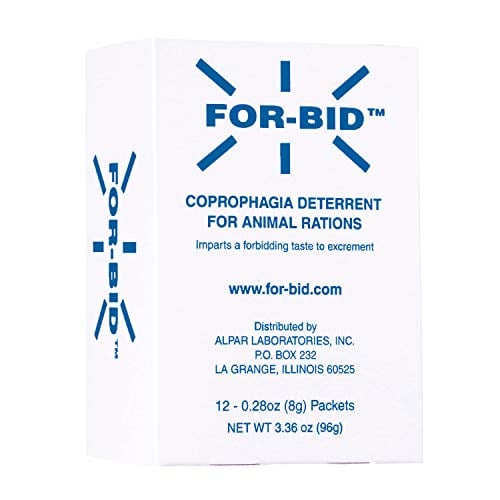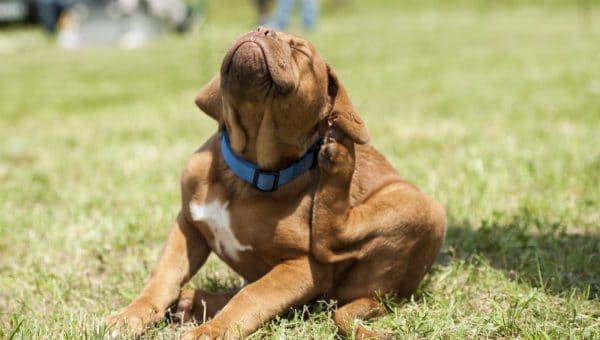- This post contains affiliate links. Read more here.
- Not a substitute for professional veterinary help.
Dogs do a lot of weird and gross things, but there’s one that stands out for just how much it offends our human sensibilities: eating poop. As humans, we can’t help but be baffled by this behavior—both in understanding why our dogs are doing it and how we can stop it. To get to the bottom of this stinky subject, we spoke to veterinarian Dr. Amanda Takiguchi and veterinary surgeon Dr. Linda Simon.
Causes for Poop Eating Behavior
The technical term for eating poop is “coprophagia”. In young dogs, coprophagia is completely normal, as explained by Dr. Amanda Takiguchi, veterinarian and founder of Trending Breeds.
“During the puppy phase (up to one year old), dogs will often eat poop for a variety of reasons: excitement, stress, curiosity, the same reason they swallow your socks, and a bunch of other reasons. Most puppies grow out of this phase within four to six months. However, some dogs develop a more long-term ‘taste’ for the feces of other animals, usually driven by anxiety,” she says.
When an older dog eats poop, it might be caused by:
- boredom
- anxiety
- nutritional deficiencies
- being left alone for too long
- fear (a dog’s desire to hide the evidence is usually trauma-based)
While she says it is more rare, Dr. Takiguchi notes that an imbalance within the gastrointestinal tract can also cause coprophagia. “If your dog is missing too many beneficial bacteria in their gut, they may be instinctively driven to eat poop in order to introduce more bacteria back into their intestines.”
Dr. Linda Simon, a veterinary surgeon and expert consultant for FiveBarks, agrees. She offers one additional explanation for why dogs often eat their own poop: “It is not uncommon for a dog to eat stool when they are left for long periods of time in a crate or outside by themselves. These dogs are attempting to keep their environment clean.”
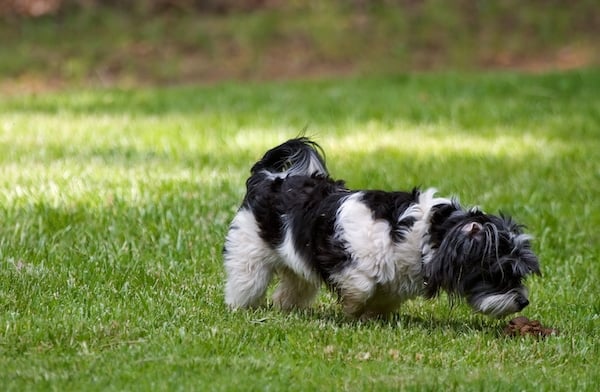
Imm0rtal via iStock
She explains that this happens even more frequently when a dog has gotten into trouble for pooping indoors in the past. A dog may try to cover their tracks to prevent future reprimands.
Dr. Takiguchi says that coprophagia will resolve on its own in most cases. Puppies grow out of it, and anxious dogs typically stop when “order is restored to the dog’s environment.” When the issue lingers, however, Dr. Takiguchi recommends taking action.
How To Stop a Dog from Eating Poop
Understanding why your dog is eating poop is critical to figuring out how to address it, Dr. Simon explains.
Rule out medical concerns
The first step is to talk with your vet to rule out underlying medical issues—particularly if coprophagia is unusual for your dog or happening in conjunction with other physical symptoms, like weight loss, loose stool, or a ravenous appetite. Your vet can perform a thorough exam with a blood test and stool analysis.
When illness is the culprit, medication and prescription diets typically work best to stop coprophagia.
Use training tools and commands
In other cases, it’s up to us as pet parents to change the situation. If your dog frequently picks up a stool snack on their walks, use a short leash or even a safe basket-style muzzle to make foraging more difficult. Making the “leave it” command a strong part of your training toolkit is critical in these moments as well.
Reduce alone time
When possible, avoid leaving your dogs alone for long periods of time. And if your dog has an accident in the house, avoid reprimanding or punishing them.
“If your dog has pooped indoors, it should be seen as our failing rather than theirs,” Dr. Simon explains. “We failed to bring them outside on time, or to recognize the cues that they needed to go.”
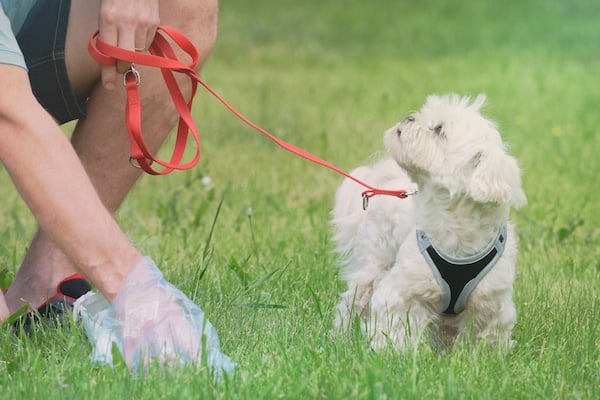
humonia via iStock
For puppies, Dr. Takiguchi explains that the most effective approach feels somewhat counterintuitive.
“Trying to prevent this practice might actually encourage it, as it will be bestowing attention on the puppy. Gently stop it if you catch your dog in action and then remove the poo, but only when the dog is not around so that it doesn’t get the impression that you are helping it pick up the poo in your own way!”
Products That Stop your Dog From Eating Poop
If you’ve ruled out an underlying illness with your vet, dietary supplements can also help to prevent your dog from eating poop.
Dr. Takiguchi recommends adding small amounts of pineapple to your dog’s diet to change the enzymes in their gut and stool.
Covering exposed feces with strong, unappealing flavors like hot sauce or apple cider vinegar is another effective tactic. “After a bite or two, they’ll realize it’s not worth it,” she explains.
There are also dietary supplements you can buy to support a dog’s gut health and make their own stool less appealing.
Dr. Simon recommends For-Bid, often considered the best supplement to stop a dog from eating poop. Veterinarians and pet parents have used this coprophagia supplement for more than 60 years. Sprinkle a packet of For-Bid powder on your dog’s food at mealtime to add “a forbidding taste” to their feces.
Strella Lab No Poo Chews are another supplement intended to help reduce your dog’s interest in their own poop. They not only help to balance your dog’s gut enzymes and make their stool less appealing, but they also help to combat bad breath—which every dog parent can appreciate.
The Zesty Paws Chew No Poo Bites offer a probiotic stool-eating deterrent, breath freshener, and support for healthy gums and teeth all in one. They use capsicum (more commonly known as chili pepper) extract to add an unwelcome flavor to your dog’s stool.
While lots of pet parents have success with supplements, it’s clear they don’t work for all dogs or all situations. In particular, pet parents who have trouble with a dog eating cat litter may want to try a dog-proof litter box or products like the FlexLatch, which is designed to keep a door cracked open so that cats can pass through to access the litter box but dogs can’t.
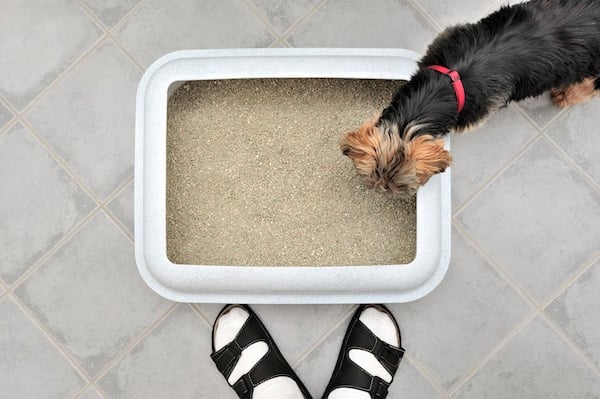
schulzie via iStock
Ultimately, it can take some trial and error to find the right solution. With complex issues like coprophagia, a combination of behavioral intervention, reducing environmental opportunities, and supplements often offers the best outcome.
Watch this quick video with everything you need to know about why dogs eat poop:
The Bottom Line: What the Experts Say
According to Dr. Simon, approximately one in five dogs eat poop. For pet parents dealing with this issue, that statistic may offer some comfort: you and I are definitely not alone.
However, because there’s no one reason for why a dog is dealing with coprophagia, there’s no one solution to the problem. My Terrier’s reason for raiding the litter box is likely very different than why your dog ate poop found on a walk.
It’s up to dog parents—and, often, their veterinarian—to identify the patterns around the behavior and address them accordingly with a combination of strategies that might include medical intervention, training, or supplements.
How We Chose the Products Included Here
For this topic, we selected products that were explicitly mentioned by our veterinary experts. Additional products were chosen based on our own experience as well as user reviews across a variety of retail platforms. Our own beloved pets also guide our selections, as we consider the products that could most benefit them (and they are never stingy with their feedback).
Need some help training your pup to “leave it”? Apps like Good Pup offer private virtual training. The Rover editorial staff have had a blast working on everything from sits and stays to trickier problems like separation anxiety, leash reactivity, and yes—”leave it,” too.
